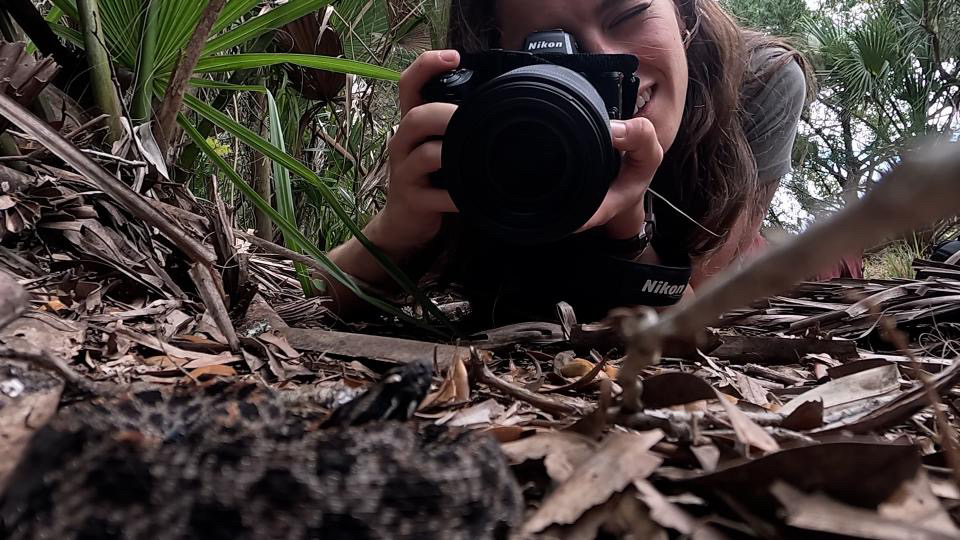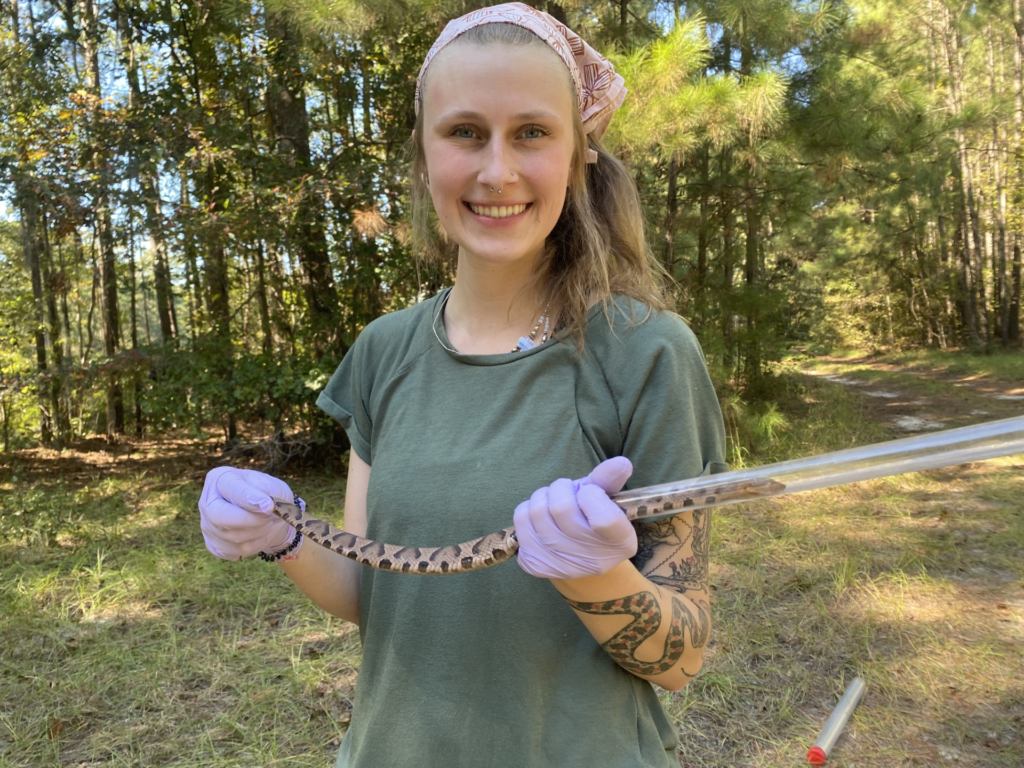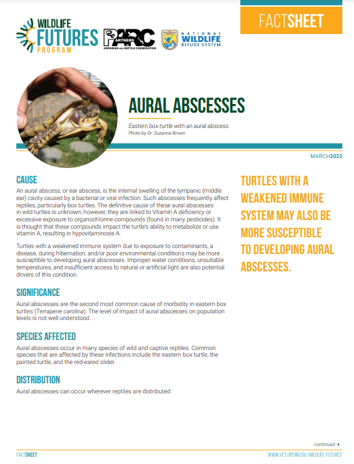Reptiles and amphibians are among the most imperiled vertebrate taxa, and pathogens are playing a role in their decline. In the past 15 years, widespread epidemics have been observed, such as those associated with Batrachochytrium dendrobatidis (a type of chytrid fungus) and ranavirus. Recently, Ophidiomyces ophiodiicola (Snake Fungal Disease) in the eastern USA and a new species of chytrid fungus in Europe (B. salamandrivorans) emerged. Undoubtedly, humans are playing a role in the emergence of herpetofaunal pathogens, whether through altering environmental conditions or translocating pathogens over large geographical distances, where they function as novel disease agents. Conserving the health of herpetofaunal populations is fundamental to conserving the integrity and biodiversity of ecosystems.
Partners in Amphibian and Reptile Conservation (PARC) have long recognized the importance of disease, with several PARC regions having Disease Task Teams. Responding to disease emergence often requires collaboration among government agencies, non-government organizations, universities, and the public, which can extend beyond PARC regions. Thus, PARC formed the National Disease Task Team to:
Mission:
Facilitate and guide communication and collaboration on herpetofaunal diseases among PARC regions, federal and state agencies, and partners
Objectives:
- Identify issues and concerns related to herpetofaunal disease in North America;
- Coordinate the development of outreach products on herpetofaunal diseases;
- Provide a centralized online location where outreach products on herpetofaunal diseases are available; and
- Facilitate rapid response to, surveillance of, and research on emerging pathogens in herpetofaunal populations.
Ensuring the health of herpetofaunal populations requires an integrated response and management plan that combines epidemiological knowledge, pathogen surveillance, population monitoring, biomedical diagnostics, and intervention strategies. Success of strategic plans for wildlife diseases demands significant coordination among various experts and natural resource practitioners.
Herpetofaunal Disease Factsheets and Resources
Click here to see PARC Amphibian & Reptile Disease Task Team resources, including factsheets, region-specific resources, webinar recordings, useful websites and other helpful information.
- Enhanced Between-Site Biosecurity to Minimize Herpetofaunal Disease-Causing Pathogen Transmission
- Minimizing Spread of Herpetofaunal Pathogens in Aquatic Habitats by Decontaminating Construction Equipment
- Guidance on Designing Surveillance Studies for Herpetological Pathogens
Herpetofaunal Disease Alert System (HDAS)
To facilitate communication of ongoing disease events in amphibians and reptiles, the PARC Disease Task Team (DTT) has created a disease alert email for people in the USA and Canada to report an incident of sick, dying, or multiple dead amphibians or reptiles. For more information, please visit this page.
PARC Disease Task Team Members
- Jenna Palmisano, Co-Chair, University of Central Florida
- Corinna Hazelrig, Co-Chair, University of Georgia
- Colby Wells, Co-Chair, Colorado Parks and Wildlife
- Lisa Shender, National Park Service
- Katie Haman, Washington Department of Fish and Wildlife
- Dan Grear, U.S. Geological Survey
- Michael Adams, U.S. Geological Survey
- A. Alonso Aguirre, George Mason University
- Matthew Allender, University of Illinois
- Jenn Ballard, Arkansas Game and Fish Commission
- Molly Bletz, University of Massachusetts Boston
- Laura Brazelton, Dallas, TX
- Michelle Christman, U.S. Fish and Wildlife Service
- Matthew Gray, University of Tennessee Institute of Agriculture
- Paula Henry, U.S. Geological Survey
- Dede Olson, U.S. Forest Service
- Christine Parker-Graham, U.S. Fish and Wildlife Service
- Laura Sprague, U.S. Fish and Wildlife Service
Jenna Palmisano, Co-Chair
Jenna Palmisano earned her BS at Stetson University where she majored in aquatic and marine biology and minored in environmental studies. Jenna is currently a second-year PhD student at the University of Central Florida in Dr. Anna Savage’s Lab. She studies the genetic and physiologic impacts of emerging pathogens on Florida pygmy rattlesnake (Sistrurus miliarius) populations. Though the focal species of her dissertation is Sistrurus miliarius, she works to assess all species of snakes in North America that are at risk of pentastomiasis caused by the invasive snake lungworm, Raillietiella orientalis that has been spilled over with established invasive species in Florida. Jenna founded a collaborative network called SLAM (Snake Lungworm Alliance and Monitoring) that consists of many researchers and land managers across the southeastern United States. Additionally, she started an invasive pentastome working group to connect all researchers studying pentastomes in the southeastern United States and serves as an Associate Editor for the disease section of Herpetological Review.

Corinna Hazelrig, Co-Chair
Corinna is a DVM-PhD student at the University of Georgia in the Southeastern Cooperative of Wildlife Disease Study (SCWDS) within the College of Veterinary Medicine. She graduated from the University of Georgia with her BSFR in Wildlife Sciences Pre-Veterinary Medicine. Her previous research projects focused on surveillance of Batrachochytrium dendrobatidis in amphibian species and co-infections of vector-borne diseases in shelter dogs. Corinna’s dissertation is on southeastern snake health including multi-pathogen surveillance in free-ranging southeastern snake species and experimental challenges with Ophidiomyces ophidiicola. Corinna’s overall objective is to contribute to improving wildlife health and conservation through pathogen and clinical research.

Colby Wells, Co-Chair
Bio coming soon!
Questions?
Reach out to our Disease Task Team chairs by emailing: diseasetaskteam@parcplace.org


